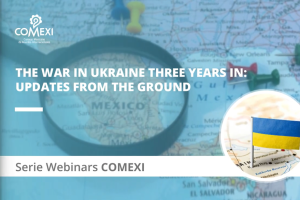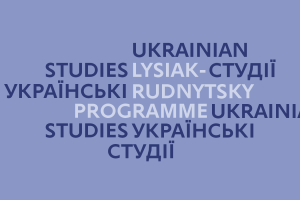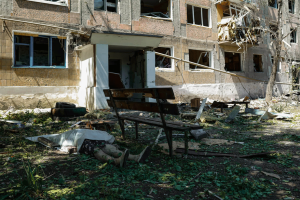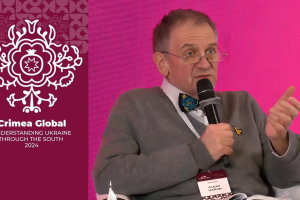28% of Ukrainians believe that the best assistance to Ukraine from the EU – pressure on Ukrainian authorities to support reforms – social polls

28% of Ukrainians believe that the best assistance to Ukraine from the EU would be putting pressure on local authorities to support reforms in Ukraine – this is almost as much as in 2015 (30.1%). The second place is a tie between the answers that Brussels should stop giving money to Ukraine, because these funds are being stolen (16.5%) and that the EU countries should be more openly opposed to Russia (16.3%). Such results of a poll that was conducted by the Ilko Kucheriv Democratic Initiatives Foundation and the Kyiv International Institute of Sociology at the request of the New Europe Center were presented at a press briefing at the Ukraine Crisis Media Center. The study was conducted from August 16 to August 28, 2018. 2041 respondents were interviewed (margin of error – 2.3%).
The majority of respondents, almost 40%, believe that pro-European reforms are necessary, even if, as a result, Ukraine will not become a member of the EU, “because these reforms are needed for the country.” Almost 21% – responded that these reforms are necessary, “because Ukraine has no other choice.

” The “European reforms” are considered unnecessary by 17% respondents; 7% believe that Ukraine should integrate into the Eurasian Union. “If we talk about financial expectations regarding the EU – this option was one of the last in poll (7.1%). As we see, the first priority is the expectation of support in fighting Russia and the pressure on the Ukrainian authorities to carry out the reforms,” said Serhiy Solodkyy, First Deputy Director of the New Europe Center.
One in five (20.6%) believe that the best support from the United States would be security guarantees for Ukraine. At the same time, in the South, these indicators are not very different from those in the West (22.2%). The second place – new sanctions against Russia (17.8%), and the third – support for Ukraine’s membership in NATO (14%).
12.1% respondents strongly oppose EU assistance. This is three times more than the figures for 2015 (4.69%). 16.5% are against US assistance. The highest level of non-acceptance of assistance of the United States is in the East and the South (42.2% and 22.8% respectively).
86% of Ukrainians acknowledge a presence of foreign influence on processes in Ukraine. “In this case, there is a discrepancy in the estimates of how strong and deep this influence is. Only a quarter of respondents are convinced that it is not only strong, but decisive”, – said Ruslan Kermach, political analyst of the Ilko Kucheriv Democratic Initiatives Foundation.

The main subjects of influence on Ukraine are the United States (54%) and the EU. 39% noted the influence of Russia, 29% – the International Monetary Fund. At the same time, as “positive” most often characterize the EU’s influence (+ 24.6% on the balance of positive and negative ratings), as well as the influence of the UN, the OSCE and the Council of Europe. The most negative influence is on Russia (-66%) and the IMF (-29%).
Hugues Mingarelli, EU Ambassador to Ukraine, Head of the Delegation of the European Union to Ukraine, in his commentary to the study, noted that while there is a high public demand for pressure from Brussels on Ukrainian authorities, EU requirements need to remain balanced.

“It is clear that if we provide cooperation programs, loans to reform some sectors (…), these funds, grants, loans will be dispersed only if the number of steps is taken to reform the sector. (…) But at the same time, we have to be careful about the way we present these conditions – because it is up to Ukrainian leadership, which has been elected by Ukrainian people. We have to find the right balance between, on one side, the need to attach conditions to our cooperation programs and loans (…) at the same time we have to do that in full respect of the sovereignty of this country,” Hugues Mingarelli emphasized.
As to the request of Ukrainians for a more intensive EU pressure on Russia, Hugues Mingarelli reminded that since 2014, Brussels has already introduced three sanctions packages against Russian Federation. “These sanctions are extended every 6 months unanimously by the EU Council, and these sanctions represent a cost for Russia,” he said.
According to Olha Stefanyshyna, Director of the Government Office for European and Euro-Atlantic Integration Director of the Government Office for European and Euro-Atlantic Integration, the results of the survey indicate the need for wider communication in the media of those European integration steps that have already been made.

“We have already approved strategies that regard energy, environment, transport and logistics that are fully based on EU approaches, which will result in the implementation of the Agreement and the actual integration (…). It is a fairly bureaucratic process and citizens will not immediately be able to feel it in just a few years. Therefore, the growing support for the European aspirations is very important for us,” said Olha Stefanyshyna.
Serhii Leshchenko, Deputy Chief of the Head Department for Foreign Policy and European Integration of the Presidential Administration, noted that it is worth establishing a more active cooperation and communication between the European partners and Southern and Eastern part of Ukraine.

[Results] indicate that it is important to direct more attention of our partners to the issues of the East and the South (…) In this context, I would like to recall the President’s initiative at the last summit regarding launching projects of so-called patronage of the EU member states over certain cities in Donbas, which are controlled by Ukrainian government – this could bring more understanding of European values and what the can give Ukraine,” he said.
Detailed results of the poll are available here.








